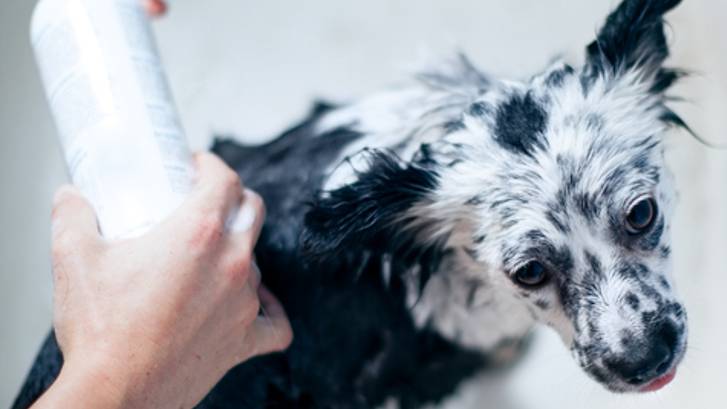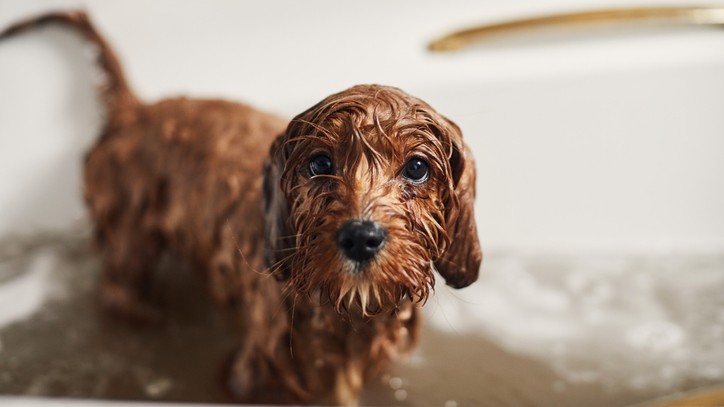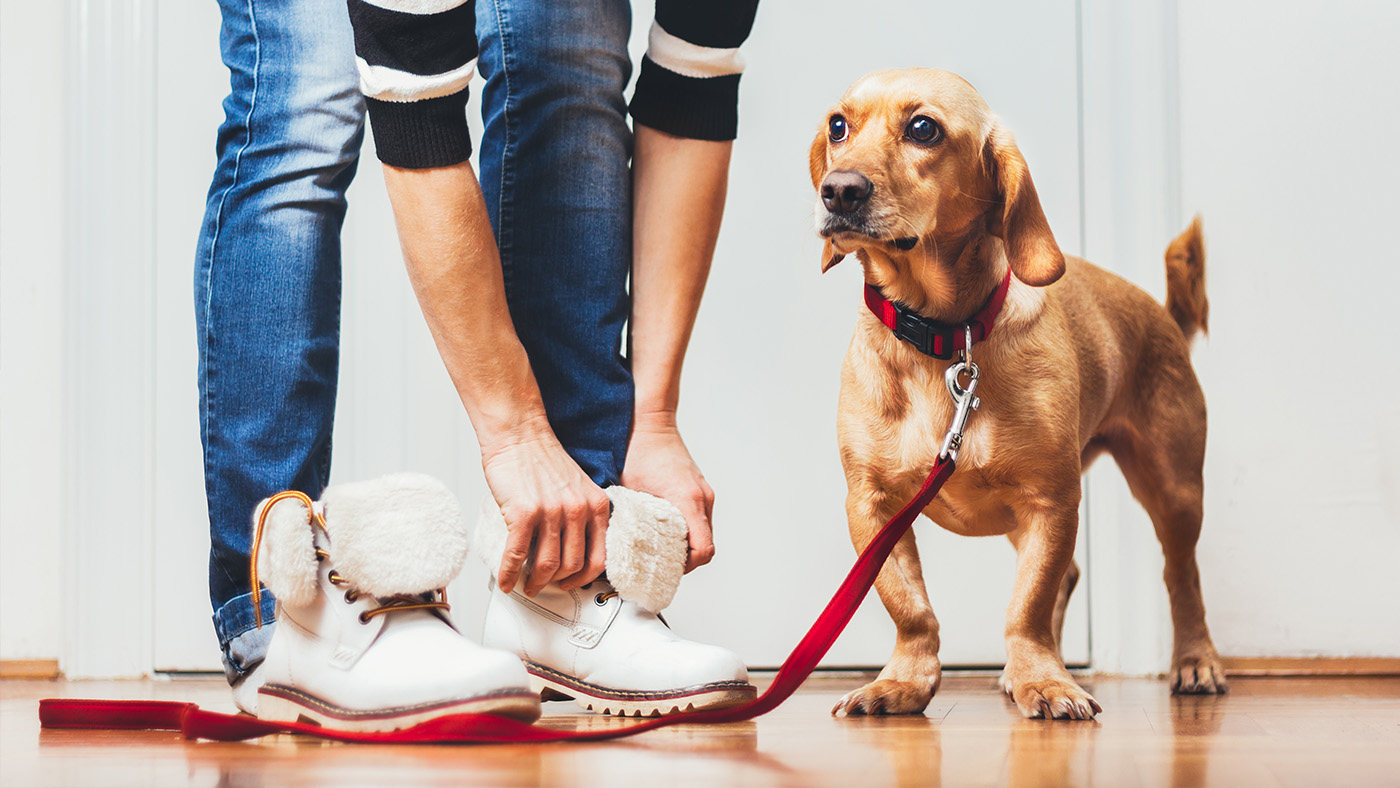Dog shampoo allergy: Vet's guide to symptoms and treatment
Is your dog red and itchy after bathing? Learn about shampoo allergies here!

Does your dog get red and itchy after every bath? If so, it’s possible that your dog has a shampoo allergy.
Although true shampoo allergies are uncommon, they can occur and they can be tricky to manage. Some dogs don’t have a true shampoo allergy but are simply irritated by residual shampoo left on their skin after a bath, so it’s important to rinse your dog thoroughly after every bath and ensure that all shampoo is washed away.
For pups that do have shampoo allergies, finding the right dog shampoo that doesn’t cause a reaction can be a bit of a trial and error process, and you may need to take some other steps to manage your dog’s allergies as well.
Read on to learn more about shampoo allergies in dogs and what you can do to help your dog’s skin.
Can shampoos cause allergic reactions?
Yes, shampoos can cause allergic reactions in dogs. Dogs can experience allergic contact dermatitis (ACD), a delayed hypersensitivity reaction that occurs after repeat exposure to an allergen.
However, dogs can also experience irritant contact dermatitis (ICD), a non-specific inflammatory reaction that occurs following direct contact with an irritating substance.
Both ACD and ICD can occur as reactions to shampoo, and it can be difficult to differentiate one from the other. For simplicity’s sake, in this article we will refer to shampoo allergies, but please keep in mind that your dog’s reaction may not be a true allergy, but rather an irritant reaction, which is treated differently.
Dog shampoo allergy symptoms
If your dog has an allergy to shampoo, one of the first things you will notice is that your dog has a reaction soon after bathing.
With a true shampoo allergy, this reaction typically occurs first in hairless or sparsely haired regions of the body such as the abdomen, the axillae (armpits), the inguinal regions (groin), underneath the neck, under the tail, the scrotum, the perianal region, the muzzle, and the pinnae (external ears).
You may notice red, blotchy areas at first. With chronic exposure, thickening of the skin, hair loss, and hyperpigmentation can occur. Scaling or crusting may also be present, and your dog may or may not be itchy.
If you notice any of these symptoms or any other changes in your dog’s skin, a visit to your veterinarian is in order.

Diagnosis of shampoo allergies in dogs
If you’ve noticed changes in your dog’s skin, the first step is a visit to your veterinarian for an examination. Be sure to tell your veterinarian if these changes have been occurring in relation to bathing or shampooing your dog, as this can help your veterinarian diagnose a shampoo allergy.
Your veterinarian will perform a full physical examination on your dog, including close examination of your dog’s skin. Because many skin conditions can present with similar symptoms, your veterinarian may recommend additional diagnostic testing such as a skin scraping to look for parasites or taking samples to check for skin infections.
Your veterinarian may also prescribe medicated shampoo for you to try with your dog. It may take some trial and error to find a shampoo that works best for your dog and does not cause a reaction.
What to do if your dog reacts badly to shampoo
Thoroughly rinse away product
If your dog reacts badly to shampoo, the first step is to rinse away all of the previous shampoo product as thoroughly as possible.
This is especially important if you have bathed your dog in the past few days. Unfortunately, finding a shampoo product that your dog can tolerate will be a bit of trial and error, as there is no test that can tell us what products will work best for your dog.
Consider a human baby shampoo test
Wait until your dog’s skin issues have resolved before you try bathing your dog again, so you’ll know if your dog has a reaction to the new shampoo.
Many allergic dogs tolerate human baby shampoo well, so this is a good starting point for many pet owners.
Be sure to rinse the shampoo thoroughly as any shampoo left on your dog’s skin may cause irritation, which could be mistaken for allergy. After bathing, dry your dog well to reduce the risk of skin infections.
Consult with your vet
Your veterinarian can also prescribe a medicated shampoo which may help reduce your dog’s allergy symptoms.
These shampoos often contain medications such as antimicrobials, antifungals, and mild steroids to help eliminate infections and reduce inflammation.
Medicated shampoos designed to calm and soothe the skin are also available, and may work well for dogs with shampoo allergies.
Try hypoallergenic soap free as a last resort
Some dogs simply cannot tolerate any shampoo. If this is the case for your dog, and you still need to bathe your dog regularly, try using hypoallergenic soap free products intended for humans.
This is a last resort to allow you to still bathe your dog without resorting to shampoos that make your dog itchy and uncomfortable.
How to help a dog with skin allergies
Many dogs with allergies to shampoo also have other skin allergies. Like humans, dogs can be allergic to certain foods, to environmental allergens such as pollens, grasses, or dust mites, or to a combination of foods and environmental allergens.
To address your dog’s allergies, the first step is getting them properly diagnosed by your veterinarian.
Do not waste your money on over the counter “allergy tests” that use hair or saliva samples to test your dog for allergies – these tests are not accurate! Environmental allergies can be diagnosed via blood test through your veterinarian, but there is no reliable test for food allergies except for performing an elimination diet trial with a hypoallergenic diet.
Your veterinarian can help you with this process to properly diagnose your dog with food allergies if this is a concern for your dog. If possible, eliminating the allergen(s) to which your dog reacts will help reduce your dog’s allergy flare-ups and associated symptoms.
Many allergic dogs improve with medication. Your veterinarian can prescribe oral or injectable allergy medications for your dog to help relieve itching and improve the symptoms of allergies.
Many dogs also experience secondary skin infections as a result of allergies, so antibiotics or topical antimicrobials may be necessary. Your veterinarian is your best resource for medications and guidance on the best products to help manage your dog’s skin allergies.
PetsRadar Newsletter
Get the best advice, tips and top tech for your beloved Pets
Dr. Elizabeth Racine is a small animal general practice vet covering all things pet health and wellness. Her special interests include veterinary behavior, nutrition, and internal medicine.
As a freelance writer, Dr. Racine has written content for major companies in the industry such as the American Kennel Club, Merck Animal Health, Bayer PetBasics, Elanco, and CareCredit. In her free time, Dr. Racine enjoys playing trampoline dodgeball, hiking with her beagle Dasher, and spending time with her three mischievous cats.

